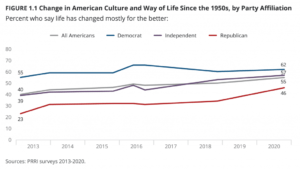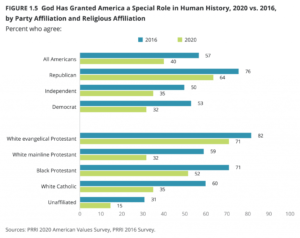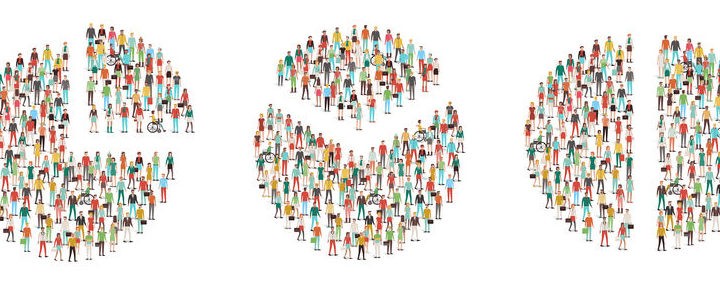If you just can’t get enough of surveys and polls during this election season, the research firm PRRI has good news for you: They’ve just completed an omnibus survey of the American electorate with more data than you can possibly digest.
The text version of the survey report runs 18,000 words. That’s 40 pages of single-spaced 12-point type.
White evangelical Protestants (59%) are the only major religious group to say that the country is moving in the right direction.
Here are a few of the key findings that encapsulate the state of our political and faith life today:
- 67% of Americans say the country is heading in the wrong direction, compared to only 32% who say it is headed in the right direction.
- This mood is less pessimistic than public sentiment just ahead of the 2016 elections, when 74% thought the country was headed in the wrong direction and only 25% thought it was headed in the right direction.
- If you’re a Republican, you’re more likely to think the country is headed in the right direction (66%) but if you’re a Democrat, you’re highly unlikely to believe the same thing (10%).
- If you’re a Republican who trusts Fox News, you are among the most likely Americans to think the country is moving in the right direction (79%). That’s a 21-point advantage over Republicans who trust other news sources (58%).
- White evangelical Protestants (59%) are the only major religious group to say that the country is moving in the right direction.
- By comparison, only 13% of Black Protestants say the country is headed in the right direction.
- A majority of Americans (55%) believe American culture and way of life have mostly changed for the better since the 1950s, but a majority of Republicans (52%) believe American culture and way of life have changed for the worse since the 1950s. (That’s actually an improved positive outlook for Republicans than in 2016 polling.)
- Solid majorities of white evangelical Protestants and Hispanic Protestants say things have changed for the worse since the 1950s (57% and 55%, respectively).
 Much of the data in the new PRRI survey, conducted between Sept. 9 and 22 and between Oct. 9 and 12, mirrors other surveys on the election, the pandemic and racial justice concerns. Public Religion Research Institute is the research firm run by Robert P. Jones, author of the new book White Too Long.
Much of the data in the new PRRI survey, conducted between Sept. 9 and 22 and between Oct. 9 and 12, mirrors other surveys on the election, the pandemic and racial justice concerns. Public Religion Research Institute is the research firm run by Robert P. Jones, author of the new book White Too Long.
Religious pluralism
The PRRI survey did unearth some results not commonly reported in other polling. For example, respondents were asked about their views on religious pluralism. To address this, interviewers presented a 10-point scale where one end is the statement “I would prefer the U.S. to be made up of people belonging to a wide variety of religions” and the other end is the statement “I would prefer the U.S. to be a nation primarily made up of people who follow the Christian faith.”
About four in 10 (38%) mostly agree with the first, more diverse statement, while 25% mostly agree with the second, more Christian-slanted statement, and 36% position themselves in the middle of the scale.
“There are deep divides along partisan and religious lines in preferences for religious diversity.”
However, the report notes: “There are deep divides along partisan and religious lines in preferences for religious diversity. Only 13% of Republicans, compared to 43% of independents and 53% of Democrats, mostly agree with the first statement.” By comparison, 43% of Republicans and 16% of Democrats mostly agree with the second statement.
White evangelical Protestants are the only group in which a majority (58%) expressed a preference for a mostly Christian country.
Is the U.S. a ‘Christian nation’?
Church-state separationists will be dismayed by the perspectives on whether America is or ever has been a “Christian nation.”
More than one-third (36%) of Americans believe this country always has been and is currently a Christian nation, while 40% say it was a Christian nation but no longer is and 22% say the U.S. never has been a Christian nation.
Republicans (49%) are more likely than independents (35%) and Democrats (30%) to say the U.S. is a Christian nation. Another 43% of Republicans say the U.S. was a Christian nation but is no longer, leaving only 7% to say the U.S. never has been a Christian nation.
 PRRI found a notable shift, however, in attitudes about whether God has granted the U.S. a special role in human history — a branch of thinking known as “American exceptionalism.”
PRRI found a notable shift, however, in attitudes about whether God has granted the U.S. a special role in human history — a branch of thinking known as “American exceptionalism.”
For the first time since PRRI first asked this question in 2011, less than a majority of Americans (40%) expressed belief that God has granted the U.S. a special role in human history, while 58% disagreed. Also, the share of Americans who “completely disagree” with this proposition (40%) has nearly doubled since the question was last asked, in the lead-up to the 2016 election.
Following the pattern on other questions, Republicans are twice as likely (64%) as Democrats (32%) to believe America has been given a special status by God. White evangelical Protestants (71%) are the most likely to believe this.
Does the U.S. provide a moral example?
Despite the belief in American exceptionalism, only a fourth of those polled (26%) said they believe America sets a good moral example to the rest of the world. Fully three-fourths (74%) disagree with the assessment that America sets a good moral example.
Republicans (45%) are more likely than Democrats (18%) to agree with this statement, but majorities of both groups disagree (55% of Republicans and 81% of Democrats). Since 2018, Republican agreement with this statement has dropped 22 percentage points (from 67% to 45%).
Even white evangelical Protestants don’t believe America sets a moral example. Affirmation of this statement among white evangelicals has dropped from 46% just two years ago to 28% today. PRRI found no religious groups in which a majority agree that the U.S. sets a good moral example for the world.
Related articles:
Who are these ‘evangelicals’ pollsters keep talking about?
How you view police killings, racism and monuments influenced by faith and party


